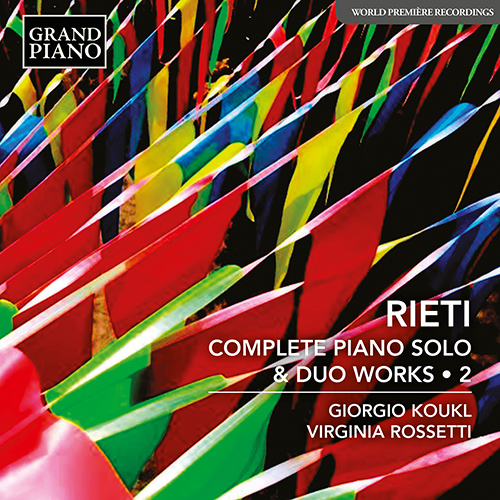
About this Release
“Rieti’s music is often described as being lyrical, expressive, and full of emotion. It can be both delicate and powerful, and it often evokes a sense of yearning. For me, Rieti’s music is a reminder of the beauty and fragility of life. It is a reminder that even in the darkest of times, there is always hope. His music is also a source of comfort and inspiration, and it always makes me feel more connected to the world around me. Rieti was not afraid to experiment with different styles and genres. This eclecticism gives his music a unique and refreshing sound, elegant, witty, and sophisticated.” — Virginia Rossetti
RIETI, VITTORIO (1898–1994)
Complete Piano Solo & Duo Works • 2
- Giorgio Koukl, piano
- Virginia Rossetti, piano
Vittorio Rieti’s admission that his musical style was largely neo-Classical belies a cosmopolitan openness to influences that range from Les Six, the Second Viennese School and Stravinsky. This recording shows a youthful and at times mischievous approach – Rieti frequently puts a smile on the face of his music, united with a fondness for brevity, and melodies reminiscent of the atmosphere of Parisian clubs. The Chess Serenade has a whiff of New York Broadway about it, and the dance character in many of these pieces reflects Rieti’s successful work for the stage. Following on from the critically acclaimed first volume (GP921), Giorgio Koukl – described as ‘one of the five or six greatest living pianists today’ by The Art Music Lounge – is once again joined in the works for piano duo by the prize-winning pianist Virginia Rossetti.
Tracklist
|
Briciole (1920) (00:05:00 )
|
|
1
No. 1. Berceuse (00:01:09)
|
|
2
No. 2. Il Carillon rotto (00:01:06)
|
|
3
No. 3. Il Carillon scordato (00:00:23)
|
|
4
No. 4. Chopin-Debussy (00:01:34)
|
|
5
No. 5. Marionette (00:01:05)
|
|
2 Studi (1923) (00:04:00 )
|
|
6
No. 1. Semplice e con moto (00:02:05)
|
|
7
No. 2. Scorrevole (00:02:08)
|
|
8
Piano Suite (1926): IV. Canzonetta (1926) (00:01:39)
|
|
Chess Serenade (1945) (00:15:00 )
|
|
9
I. Prelude (00:02:46)
|
|
10
II. Gavotte (00:04:19)
|
|
11
III. Serenade (00:01:18)
|
|
12
IV. Valse (00:02:56)
|
|
13
V. Clown March (00:02:32)
|
|
Contrasti (1967) (00:10:00 )
|
|
14
No. 1. Preludio (00:01:11)
|
|
15
No. 2. Variazioni (00:02:30)
|
|
16
No. 3. Bagatella (00:00:57)
|
|
17
No. 4. Elegia (00:00:48)
|
|
18
No. 5. Girandola (00:02:15)
|
|
New Waltzes (1957) (00:20:00 )
|
|
19
No. 1. Belinda Waltz (00:02:07)
|
|
20
No. 2. Valse Caprice (00:06:13)
|
|
21
No. 3. Valse Champêtre (00:03:15)
|
|
22
No. 4. Valse Légère (00:01:51)
|
|
23
No. 5. Valse Lente (00:05:12)
|
|
24
No. 6. Rondo Waltz (00:04:11)
|
|
Chironomos (1972) (00:10:00 )
|
|
25
I. Preludio (00:01:39)
|
|
26
II. Allegro volante (00:01:03)
|
|
27
III. Intermezzo (00:02:03)
|
|
28
IV. Mazurka (00:01:49)
|
|
29
V. Improvviso (00:01:47)
|
|
30
VI. Epilogo (00:01:48)
|
|
31
Valse pour Léonor (1972) (00:01:06)
|
|
4 Piano Pieces (1992) (1992) (00:06:00 )
|
|
32
No. 1. Tempo giusto (00:01:01)
|
|
33
No. 2. L'istesso tempo (00:00:48)
|
|
34
No. 3. Andante poco mosso (00:02:30)
|
|
35
No. 4. Allegro alla tarantella (00:01:29)
|
The Artist(s)
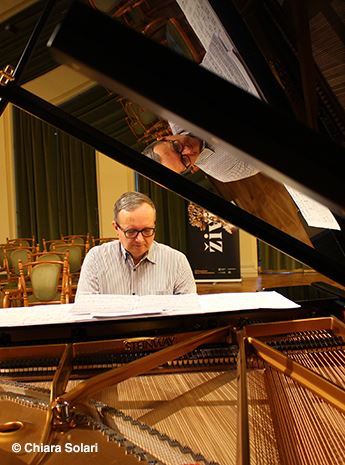 Giorgio Koukl is a Czech pianist/harpsichordist and composer. He studied at both the Conservatories of Zürich and Milan, where he took part in the masterclasses of Nikita Magaloff, Jacques Février, and Stanislaus Neuhaus, and with Rudolf Firkušný, friend and advocate of Czech composer Bohuslav Martinů. It was through Firkušný that Koukl first encountered Martinů‘s music, and is now considered one of the world’s leading interpreters of Martinů‘s piano music. As a logical continuation of this work, Koukl has recorded the complete solo piano works of Paul Le Flem, Alexander Tcherepnin, Arthur Lourié, Vítězslava Kaprálová, Witold Lutosławski, and more recently, Alexandre Tansman and Tibor Harsányi.
Giorgio Koukl is a Czech pianist/harpsichordist and composer. He studied at both the Conservatories of Zürich and Milan, where he took part in the masterclasses of Nikita Magaloff, Jacques Février, and Stanislaus Neuhaus, and with Rudolf Firkušný, friend and advocate of Czech composer Bohuslav Martinů. It was through Firkušný that Koukl first encountered Martinů‘s music, and is now considered one of the world’s leading interpreters of Martinů‘s piano music. As a logical continuation of this work, Koukl has recorded the complete solo piano works of Paul Le Flem, Alexander Tcherepnin, Arthur Lourié, Vítězslava Kaprálová, Witold Lutosławski, and more recently, Alexandre Tansman and Tibor Harsányi. 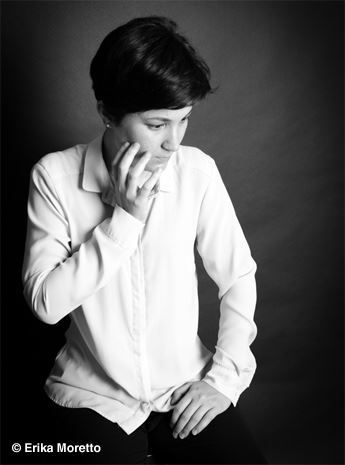 Virginia Rossetti began her piano studies with Massimiliano Ferrati, later attending the ‘Antonio Buzzolla’ Conservatory in Adria where she graduated with honours. She has a Master of Performing Arts with distinction at the Hochschule für Musik in Basel and a Master in Pedagogy at the Conservatorio della Svizzera italiana. Rossetti is a prize winner of several national and international piano competitions including the Premio Venezia 2009, reserved for the best graduates under the patronage of the Republic’s President, and the Premio Marizza in Trieste.
Virginia Rossetti began her piano studies with Massimiliano Ferrati, later attending the ‘Antonio Buzzolla’ Conservatory in Adria where she graduated with honours. She has a Master of Performing Arts with distinction at the Hochschule für Musik in Basel and a Master in Pedagogy at the Conservatorio della Svizzera italiana. Rossetti is a prize winner of several national and international piano competitions including the Premio Venezia 2009, reserved for the best graduates under the patronage of the Republic’s President, and the Premio Marizza in Trieste. The Composer(s)
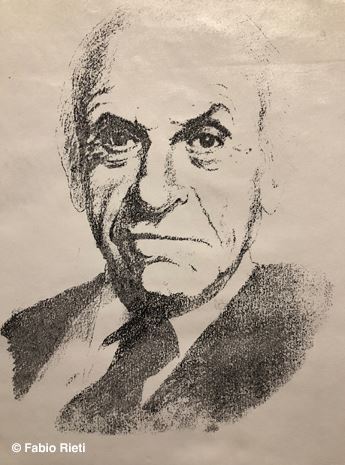 ‘My music may not be performed often, but it is performed all over the world’, wrote the Italian-American composer Vittorio Rieti (1898–1994). His orchestral works were conducted and admired by luminaries such as Rafael Kubelík, Leopold Stokowski and Arturo Toscanini but it was the piano that was arguably Rieti’s first and most significant musical love to which he brought a natural, effortless and brilliant style. The Second Avenue Waltzes for two pianos, one of his greatest works, is an expression of his maturity and full of charm, whereas the later Twelve Preludes for solo piano reveal a wealth of inventiveness. One of his most successful pieces, the Suite champêtre for two pianos, is fuelled by grace and elegance. Giorgio Koukl has been called ‘one of the five or six greatest living pianists today’ by The Art Music Lounge; he is joined in the works for piano duo by the prize-winning pianist Virginia Rossetti.
‘My music may not be performed often, but it is performed all over the world’, wrote the Italian-American composer Vittorio Rieti (1898–1994). His orchestral works were conducted and admired by luminaries such as Rafael Kubelík, Leopold Stokowski and Arturo Toscanini but it was the piano that was arguably Rieti’s first and most significant musical love to which he brought a natural, effortless and brilliant style. The Second Avenue Waltzes for two pianos, one of his greatest works, is an expression of his maturity and full of charm, whereas the later Twelve Preludes for solo piano reveal a wealth of inventiveness. One of his most successful pieces, the Suite champêtre for two pianos, is fuelled by grace and elegance. Giorgio Koukl has been called ‘one of the five or six greatest living pianists today’ by The Art Music Lounge; he is joined in the works for piano duo by the prize-winning pianist Virginia Rossetti. 
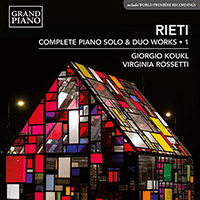
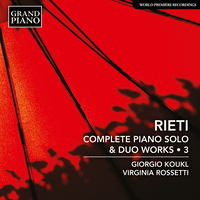
 Grand Piano has gained a reputation for producing high quality recordings of rare keyboard gems. Dedicated to the exploration of undiscovered piano repertoire, the label specialises in complete cycles of piano works by many lesser-known composers, whose output might otherwise have remained unknown and unrecorded.
Grand Piano has gained a reputation for producing high quality recordings of rare keyboard gems. Dedicated to the exploration of undiscovered piano repertoire, the label specialises in complete cycles of piano works by many lesser-known composers, whose output might otherwise have remained unknown and unrecorded.






